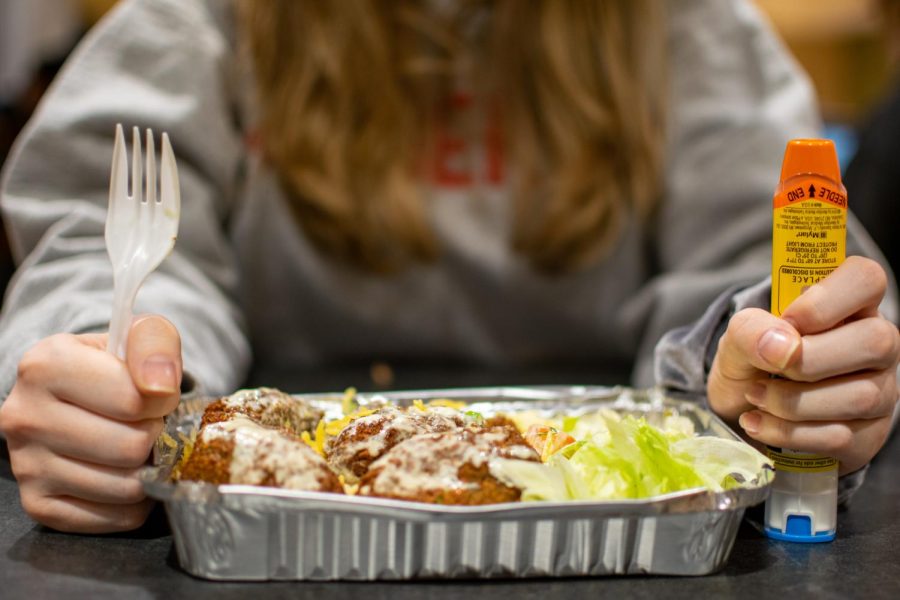A Guide to Dining with Severely Allergic Friends
ANDREW BEECHER/THE OBSERVER
Understanding how to use an EpiPen is the first step to being considerate of friends with severe allergies.
December 4, 2019
If I had to guess the most common question I’ve been asked, it would undoubtedly be: “So, what happens if you eat nuts?”
“I start choking, losing air. I could even die, depending on the nut,” I respond cavalierly, with a smile and a shrug.
When the inevitable gasp arrives or a look of severe concern flashes across their face, I can’t help but laugh. No one can figure out why I treat such a serious issue with humor — possible explanations include me being a sadist, humor being my only coping mechanism and the irresistible satisfaction that comes with the line landing every single time.
But laughter quickly melts into paranoia as I look over the menu for the 10th time, dreading the moment I’ll have to tell the waiter about my allergy and praying they won’t forget. Even after I’ve triple-checked with my waiter once the food arrives, every bite is tinged with the fear that it might be my last. My only respite from an overwrought mind is the knowledge that my family and friends actively work to create a safe dining environment for me. Here’s how:
If they have an EpiPen with them, learn how to use it. Be ready to administer the drug in case of an emergency.
EpiPens, short for Epinephrine Auto-Injectors, are syringes filled with a single dose of medication that can reverse or delay the effects of a severe allergic reaction until medical personnel arrive. Although administering the drug may seem like a huge responsibility, there are only three steps written out on the needle (pull off both blue caps, push red tip hard in thigh for 10 seconds and seek medical attention); newer EpiPens will also play pre-recorded audio instructions.
Avoid cuisine that tend to incorporate common allergens.
When choosing a restaurant or cuisine for the group, it’s important to take the allergen in question into consideration. If the person is allergic to peanuts, for example, Thai food may not be the best choice. If the issue lies in sesame seeds, Mediterranean food could create some issues as well. To save time and effort on your part, ask your friend for restaurant suggestions — they’ve done a lifetime of research and testing on safe and delicious food spots.
Order allergen-free dishes for the entire table.
If your party chooses to order dishes to share, consider ordering allergen-free dishes for the entire table. This way, no one is ostracized and the discussion of food becomes a more lively and inclusive experience. Depending on the restaurant or cuisine that your party chooses, this decision may limit the number and variety of dishes you will be able to try, but returning to the restaurant on a different day is always an option.
If you choose to share food with allergens, use separate utensils.
After you and your friend have decided to order dishes with or without the allergen, be sure to use different utensils when sharing food. You may want to use a communal spoon for dishes that many people will be eating from, or rearrange the food so that the food closest to your friend is allergen-free. Ask everyone at the table to try to remain vigilant about not accidentally mixing dishes by using their personal utensils to scoop food.
Step in to help with language barriers to convey the severity of the allergy.
When it comes to foreign restaurants, there may be instances where the waitstaff are more comfortable speaking their native language. If you are familiar with the language, step in and convey the severity of the allergy to the server.
Check in from time to time. If they seem oddly quiet or look uncomfortable while eating, don’t hesitate to ask why.
Being the only person with food allergies among friends or family can be incredibly isolating when dining out, which can lead to feeling like a burden and not wanting to “ruin the mood” or impose unnecessary stress on those who can eat without limits. A long stretch of silence or lack of enthusiasm might be masking a swarm of anxious thoughts — checking in once in a while won’t hurt.
This is not to say that dining out with a severely allergic friend requires bearing the fragility of their immune system on your shoulders for the entire meal. Your friend is fully responsible for their safety, but those who are dining with them have the unique ability to transform their experience — it only takes a few simple changes.











